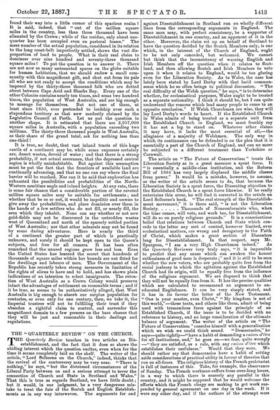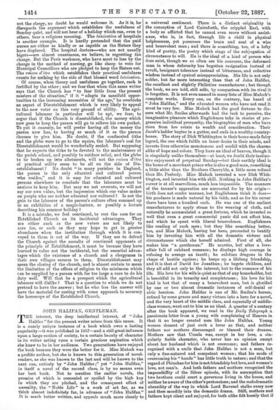THE "QUARTERLY REVIEW" ON THE CHURCH.
THEQuarterly Review touches in two articles on Die- establishment, and the fact that it does so shows the abiding interest which the question excites, even when for the time it seems completely laid on the shelf. The writer of the article, "Lord Selborne on the Church," indeed, thinks that the revival of the controversy may be very near. " There is nothing," he says, "but the distressed circumstances of the Liberal Party between us and a serious attempt to lever the connection of Church and State in Scotland and Wales." That this is true as regards Scotland, we have little doubt ; but it would, in our judgment, be a very dangerous mis- take to treat the fate of the Scotch and English Establish- ments as in any way interwoven. The arguments for and
against Disestablishment in Scotland run on wholly different lines from the corresponding arguments in England. The same man may, with perfect consistency, be a supporter of Disestablishment in one country, and an opponent of it in the other. Moreover, the claim set up on behalf of Scotland to have the question decided by the Scotch Members only, is one which, in the interest of the Church of England, ought to be not only conceded, but welcomed. We cannot but think that the inconsistency of warning English and Irish Members off the question when it relates to Scot- land, and then allowing Scotch and Irish Members to vote upon it when it relates to England, would be too glaring even for the Liberation Society. As to Wales, the case has lately been stated by Lord Derby with that lucid common- sense which he so often brings to political discussion. "The real difficulty of the Welsh question," he says," is to determine whether, for ecclesiastical purposes, Wales ought to be treated as a separate nationality. I think it should be, but I can quite understand the reasons which lead many people to come to an opposite conclusion." If Welsh Churchmen are wise, they will lay Lord Derby's words to heart. If the Established Church in Wales admits of being treated as a separate unit from the Established Church in England, we must frankly say it has not a leg to stand on. Whatever other claims it may have, it lacks the most essential of all,—the allegiance of a majority of Welshmen. The only way in which its continuance can be defended is on the plea that it is essentially a part of the Church of England, and can no more be subjected to a different treatment than Yorkshire or Cornwall.
The article on " The Future of Conservatism " treats the Liberation Society as in a great measure a spent force. It "is essentially a middle-class institution, and the Reform Bill of 1884 has very largely displaced the middle classes from power." It would be a mistake, however, to assume, as the writer of the article seems to do, that because the Liberation Society is a spent force, the Dissenting objection to the Established Church is a spent force likewise. If he really entertains this error, he will find it corrected in the article on Lord Selbome's book. " The real strength of the Disestablish- ment movement," it is there said, " is not the Liberation Society Thousands of Nonconformists who, when the time comes, will vote, and work too, for Dieestablishment, will do so on purely religious grounds." It is a conscientious belief that relations between Church and State which con- cede to the latter any sort of control, however limited, over ecclesiastical matters, are wrong and derogatory to the Faith of Christ, which makes a great section of Dissenters long for Disestablishment. In that respect, says Mr. Spurgeon, "I am a very High Churchman indeed." As the Quarterly Reviewer very truly says, " it is impossible to predict that any cause which can awaken the honest enthusiasm of good men is desperate ;" and it is still to be seen whether the new voters, who are probably quite free from the social jealousy in which the agitation against the Established Church had its origin, will be equally free from the influence of the religious argument. We are disposed to think that they will not be equally free from it. It has the precise qualities which are calculated to recommend an argument to un- educated Englishmen. It can be very simply stated, and it has in its favour the letter of the New Testament. " One is your master, even Christ," " My kingdom is not of this world,"—these texts, and others like them, admit of being used with tremendous force against the principle of an Established Church, if the issue ie to be decided with no reference to history, and no large consideration of the ultimate balance of argument. The writer of the article on " The Future of Conservatism "consoles himself with a generalisation which we wish we could think sound. " Democracies," he says—quite rightly—"have a habit of demanding a raison d'être for all institutions, and," he goes on—we fear, quite wrongly —" they are satisfied, ae a rule, with any raison d'être which establishes their usefulness." Would that they were. We should rather say that democracies have a habit of setting aside considerations of practical utility in favour of theories that
run on all-fours. The religions history of the French proletariat is full of instances of this. Take, for example, the observance
of Sunday. The French workman suffers from over-long hours, in a way to which there is scarcely any parallel in this country, and it might be supposed that he would welcome the efforts which the French clergy are making to get work sus- pended by general agreement on one day in the week. If it were any other day, and if the authors of the attempt were not the clergy, no doubt he would welcome it. As it is, he disregards the argument which establishes the usefulness of Sunday quiet, and will not hear of a holiday which can, even to others, bear a religious meaning. The laicisation of hospitals is another example. It is hardly pretended that the paid nurses are either as kindly or as capable as the Sisters they have displaced. The hospital doctors—who are not usually bigots—are almost unanimous, we believe, in regretting the change. But the Paris workmen, who have most to lose by the change in the method of nursing, go like sheep to vote for Municipal Councillors who are pledged to keep the Sisters out. The raison d'are which establishes their practical usefulness counts for nothing by the side of that blessed word laicisation.
Of course, when theory and usefulness go together, each is fortified by the other ; and we fear that when this same writer says that the Church has " to fear little from the present masters of the situation," if it " adapts its manifold oppor- tunities to the increasing necessities of the age," he overlooks an aspect of Disestablishment which is very likely to appeal to the new voter on this very ground of utility. The agri- cultural labourer in particular will be apt, we fear, to argue that if the Church is disestablished, the money which now goes to keep the parson will go to relieve his own pocket. To put it coarsely, he will prefer having all the money the parson now has, to having so much of it as the parson chooses to give him. No doubt, if the confiscated tithe and the glebe were to go to the squire, the labourer's zeal for Disestablishment would be wonderfully cooled. But supposing that he expects the tithe to be devoted to the maintenance of the parish school, and possibly to outdoor relief, and the glebe to be broken up into allotments, will not the raison d'être of practical utility seem to be all on the side of Dis- establishment? No doubt "in many parishes in England, the parson is the only educated and cultured person vrho resides," and it is easy for educated and cultured persons elsewhere to conclude that the labourers must be anxious to keep him. But may we not overrate, we will not say our own value, but the impression which our value makes on people who are neither educated nor cultured ? Is not the gain to the labourer of the parson's culture often summed up in- an exhibition of a magic-lantern, or possibly a lecture describing his summer holiday ?
It is a mistake, we feel convinced, to rest the case for an Established Church on its incidental advantages. They are either such as the new voters are not likely to care for, or such as they may hope to get in greater abundance when the institution through which it is con- veyed to them is out of the way. If they are to defend the Church against the assaults of convinced opponents of the principle of Establishment, it must be because they have learned to value not the incidental, but the essential advan- tages which the existence of a church and a clergyman in their own villages secures to them. Disestablishment may mean the closing of the church, and is almost certain to mean the limitation of the offices of religion to the minimum which can be supplied by a parson with far too large a cure to do his duty well. Will that be a prospect which the agricultural labourer will dislike I That is a question to which we do not pretend to have the answer ; but he who has the answer will have the material for casting with some approach to accuracy the horoscope of the Established Church.







































 Previous page
Previous page